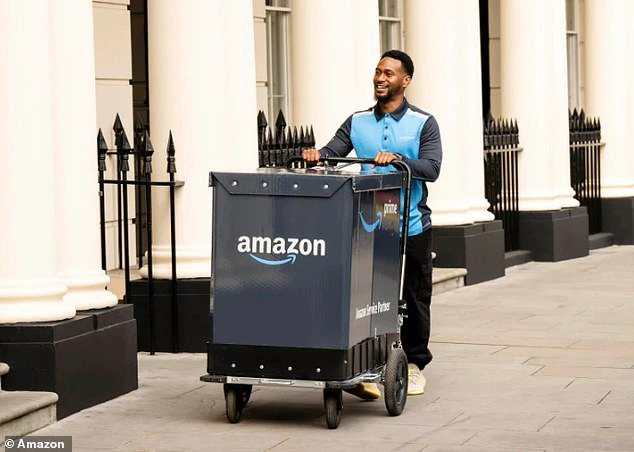Amazon is set to take on Royal Mail as it launches deliveries on foot as part of a package of measures to reduce emissions amid the climate crisis.
Employees across central London will now take to the streets with carts filled with packages instead of driving from house to house, the firm said.
The trial program is being conducted in Hackney, Westminster, and Islington, allowing employees to replenish their carts using vans stocked with supplies throughout the city.
This initiative is one of many steps taken by Amazon to reduce delivery emissions, following the company's commitment to achieve carbon neutrality by the year 2040.
Amazon assures that the new plans will not hinder or postpone deliveries, including those of Prime packages.
The company is additionally increasing its collection of electric vehicles and, for the first time, is utilizing electric rail services.
However, this indicates that Royal Mail won't be the sole delivery carts making their rounds to British households and traversing its postal paths.
Michelle Gardner, Deputy Director, Policy, Logistics UK, said: 'Decarbonisation is one of the biggest challenges facing the logistics industry, as businesses seek to match the need to move away from a reliance on fossil fuels with pressures from customers to maximise delivery efficiency.

View pictures in App save up to 80% data.
At present, nearly 90 percent of freight transport in the UK relies on roadways, making it crucial for the industry to explore vehicles powered by alternative fuels and to transition to various modes of transport to meet growing demand.
"The announcement made by Amazon today highlights the industry's readiness to adapt and its dedication to minimizing total emissions."
As well as walking deliveries, Amazon says more than 140 new electric Mercedes-Benz Truck eActros 600 trucks and eight Volvo FM Battery Electric trucks are joining Amazon's transportation network over the next 18 months, replacing traditional fuel-driven vehicles.
The company stated that this represents the largest order of eHGVs in the UK to date, significantly expanding the fleet from its existing nine vehicles.
As a component of the initiative, Amazon plans to set up extra fast charging stations at important locations throughout the UK, with the vehicles anticipated to distribute approximately 300 million parcels annually once they are fully operational.
In today's announcement, Amazon has introduced rail deliveries that utilize the UK's electric network, aiming to reduce reliance on road transportation.
It is projected that 20 million products will be transported via British rail annually.
In other locations, electric cargo delivery bicycles are set to debut in Belfast and Norwich, complementing the current programs already in place in London, Manchester, and Glasgow.

View pictures in App save up to 80% data.
According to Amazon, over 150 million deliveries have been completed in the UK utilizing its electric vans and cargo bikes since the year 2022.
The delivery company is not the only player in the sector striving to reduce emissions; however, Royal Mail stands out as a leader, having implemented on-foot deliveries since it was established.
However, Royal Mail has experienced challenges in recent years due to a decrease in letter volumes, as more people opt for parcel deliveries. This shift has led to intensified competition from companies like Amazon, Evri, and DPD.
Royal Mail announced today that it is on course to achieve annual profitability following a surge in parcel deliveries during Christmas, as the £3.6 billion acquisition by Czech billionaire Daniel Kretinsky approaches finalization.
The government approved the deal last year.
In the quarter ending December, Royal Mail experienced a 2.4 percent increase in revenue, driven by a 3.2 percent rise in parcel sales and a 1.4 percent growth in letter transactions.
The group reported that the volume of addressed letters decreased by 7 percent, but this decline was balanced out by increases in stamp prices.
In the UK, parcel sales volume held steady at 334 million, but revenue increased by 2.5 percent to reach £1.02 billion due to rising prices. Additionally, the division benefited from improved international performance, with revenues soaring by 6.6 percent to £227 million.
It is yet to be determined what impact Amazon's walking deliveries will have on Royal Mail.
The numbers are released as Mr. Kretinsky's EP Group is anticipated to complete its acquisition of IDS by the end of the first quarter, following government approval received last month.
Nicola Fyfe, the Vice President of Amazon Logistics in the EU, stated: "Reducing carbon emissions in our transportation network is crucial for us to meet our target of achieving net-zero carbon emissions across all operations by 2040. Today's announcement marks a significant and thrilling advancement in our journey towards this goal."
"The largest order of electric heavy goods vehicles (eHGVs) in our history, along with the UK's electric rail network now facilitating the transport of customer packages and the introduction of on-foot deliveries for restocking, combined with our partners' electric van and e-cargo bike fleets, will enable us to efficiently handle more customer orders throughout our fulfilment network while producing zero exhaust emissions. This initiative benefits our customers, the environment, and our business operations."